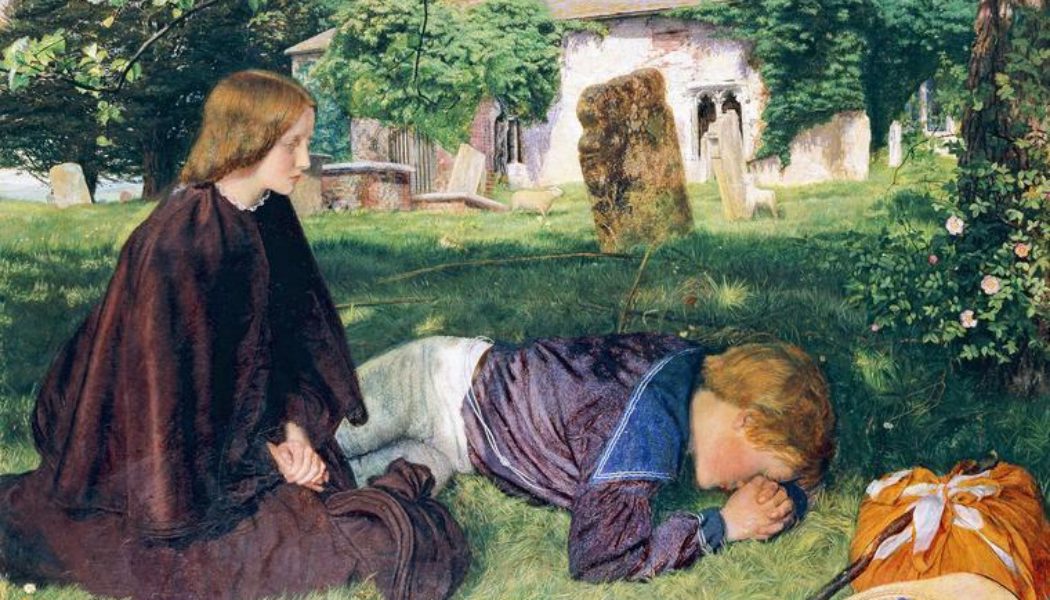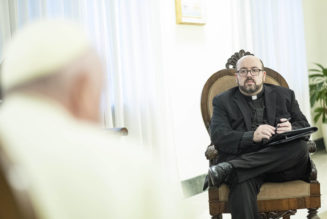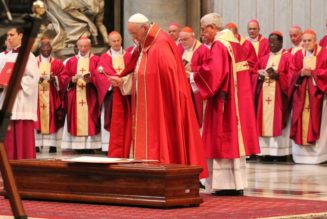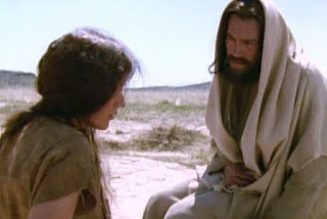
“Have you seen the dead leaves fall in the sad autumn twilight?” says St. Josemaría Escrivá. “Thus souls fall each day into eternity. One day, the falling leaf will be you.”
We’re approaching the end of November, the month the Church dedicates to prayer for the souls in Purgatory. Tradition calls them the “poor souls,” even though they are assured of eventual beatitude, because they can do nothing for themselves to reach that blessed state. In the economy of salvation, there progress depends on our charity.
November is also the month in which Catholics turn their own thoughts toward death. As both the calendar and liturgical years come to their ends, the “last things” become more prominent. The natural world is dying. Trees are losing their leaves, the day grows ever shorter and darker, vegetation grows sparse, frost pierces the earth that ends the life of many plants, and the weather grows colder. Eschatological themes — death, judgment, heaven, hell, being watchful — come to the fore in the Church’s biblical readings.
“Have you seen the dead leaves fall in the sad autumn twilight?” says St. Josemaría Escrivá. “Thus souls fall each day into eternity. One day, the falling leaf will be you.”
What can we do to remember November’s devotions throughout the year? Here are 10 suggestions:
1. Pray for the Dead. At the very least, add some prayer for the dead to your daily prayers, e.g., “Eternal Rest…” Teach it to your children: they, after all, are the most likely candidates to ever think of praying for you. Say the Rosary or the Chaplet of Divine Mercy for the dead.
2. Offer Masses. There is no better prayer we can make for the dead than Holy Mass. When is the last time you arranged to have Mass celebrated for somebody? Parents? Grandparents? Relatives? Why not resolve to do that as soon as possible? Try to attend Mass at least on one weekday every week and offer it for the deceased. If you work, many churches have lunchtime Masses, some even evening Masses. Are you too busy Saturday morning?
3. Go to a cemetery. Once upon a time in America, Catholics regularly visited the gravesites of their family members. Catholic cemeteries are religious places, too — they are part of the Church. The Church even grants a plenary indulgence, under the usual conditions (confession, Communion, prayer for the pope) for those who visit a cemetery, the period for the indulgence having been extended to all of November this year. But visiting a cemetery is an excellent chance for you to help the faithful departed throughout the year. When was the last time you visited your relatives’ gravesites?
4. Meditate on your own mortality. What you do for the dead is perhaps what might be done for you. Someday, you will be among them — as they are, you will be. Catholic spirituality has long urged us to memento mori! — remember death. It’s the decisive moment of your life. Catholic authors have long addressed this topic. Read a little bit of good Catholic literature on the subject each day. Suggestions: St. Francis de Sales, Consoling Thoughts on Sickness and Death; St. Alphonsus de Liguori, Preparation for Death. Both are readily available in print and electronic editions.
5. Arrange Gregorian Masses. Gregorian Masses are a Catholic tradition, attributed to St. Gregory the Great, who ordered the celebration of 30 Masses for the deliverance of a soul who appeared to him from Purgatory. At the end of the series, the soul returned to thank him and declare he had entered heaven. The 30 Masses must be celebrated as an unbroken, consecutive series. Many religious orders and missionary priest associations (Franciscans, Catholic Near East Welfare Association) will celebrate Mass for your faithful departed (a single person) or allow you to arrange this for yourself. They provide a card that you keep with your important documents that merely has to be sent back in notification when you die. Why not prepare at least for your own spiritual future now?
6. Make a will. You are going to die. I guarantee that there will be a funeral in your future. Have you made provision for those who will remain after you? A will decides how what you leave behind will be apportioned — without it, the state decides according to general laws. A will is also a chance to make a declaration of faith, e.g., that you provide for alms for others or the celebration of Masses for yourself after you die. It’s not hard. Why not meet with a lawyer or, in some states, a paralegal, this month? Your county bar association can make referrals, and there are probably lawyers advertising on the back of your parish bulletin.
7. Buy a grave. People can pre-plan funerals and decide where they want to be buried. The Church allows but discourages cremation, recommending that her sons and daughters follow the example of Christ, who lay in the earth. Making this arrangement now is probably less an economic shock than leaving it to relatives to do in haste when you die. Why not contact your parish or diocesan cemetery?
8. Buy a coffin. People today are concerned about the environmental impact that the American way of death — embalming, metal caskets, vaults — takes on the earth. The Church requires none of that, and many religious orders as well as laity manufacture simple but noble wooden coffins that are also signs of humble faith in death. See here, here, here, here, and here.
9. Visit a bereaved person. We all think about those left behind when somebody dies. But we never feel comfortable talking to them. As time passes, we also forget about them. The truth is, the bereaved get a lot of attention (as is proper) in the days right after death, leading up to a funeral. Two weeks out … who? We are somewhere in a pandemic in which, since its beginning, almost three-quarter of a million deaths have been attributed to COVID-19 in our country. So, it’s likely you know somebody who’s been bereaved. Give them a call. Drop in or take them out to dinner. If a child was left behind, you can — especially if you are the same sex as the lost parent — fill in something of the gap by taking the child somewhere, spending some time with the child, or maybe doing something as simple as fixing a toy or doing something the child used to do with the lost parent. Don’t know what to say? How about just being there and, if you’re still looking for words, a “Hail Mary” will do fine.
10. Attend a wake. Obviously, your ability to do this is not scheduled by the calendar, but the wake as a place of prayer for the dead is fast disappearing in American culture, the stuff more of Irish memories than lived experience. It’s a time to “pay respects,” comfort the bereaved, but — especially — to pray for the dead. Does your parish priest normally come to a wake? If not, invite him. If he still doesn’t, you can still lead the Rosary or the Chaplet of Divine Mercy.
Join Our Telegram Group : Salvation & Prosperity









